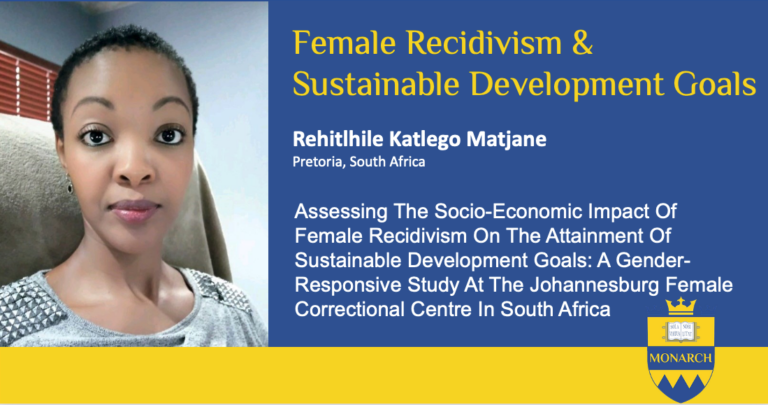Assessing The Socio-Economic Impact Of Female Recidivism On The Attainment Of Sustainable Development Goals: A Gender-Responsive Study At The Johannesburg Female Correctional Centre In South Africa

Monarch is happy to announce the recently authorised research proposal by PhD in Corporate Social Responsibility Candidate Ms. Katlego Matjane. Her research focuses on the connection between female recidivism and the move toward the attainment of the Sustainable Development Goals.
The Research
South Africa has one of the highest recidivism rates in the world, estimated to be between 50% and 90% (Schoeman, 2010; Khwela, 2014; Karrim, 2018; Cronje & Peacock, 2023). Approximately 11.5 million offenders are incarcerated in the world’s correctional facilities, 6.9% of them are women and girls. The global number of incarcerated women has increased by 53% since the year 2000 (Heard, 2017) and it is assumed that recidivism contributes to this increase. The female prison population rate of South Africa is 7.6 per 100,000 of the national female population with 4,649 of the 157,056 total offender population being women (World Prison Brief, 2023). The high rate of recidivism may be an indication that efforts to address the core reasons why women commit crime are ineffective (Adams, Klinsky, & Chhetri, 2019). The pathways that lead women to crime are largely due to layered discrimination, deprivation by their partners, families and communities, violence (Critoph, 2019), changing personal economic and social positions and the increasing feminization of poverty (Penal Reform International, 2017). The identified reasons for female criminality are directly linked to the Target Priority Areas of several Sustainable Development Goals. Failure to address these results in recidivism has the potential to negate any progress made on SDGs.
The contemplated research will explore the varied reasons why women commit crimes, how these are linked to the different SDGs and the impact perpetuation that these crimes have on the achievement of community, national and global sustainability. Seminal literature from Theories of Sustainable Development, Theories of Recidivism and Gender Theories will be examined in pursuit of developing new knowledge. The research will be based upon a phenomenological methodology of the lived experience of female recidivists and correctional officials in Gauteng Correctional Centres. The contemplated research aims to construct a new conceptual framework that infuses SDG principles into rehabilitation and reintegration programmes in female correctional centres to reduce recidivism and therefore the impact recidivism has on the achievement of SDGs. Triangulation of the academic literature, analysis of content from the South African Department of Monitoring and Evaluation, the Department of Correctional Services, the United Nations and other related institutions coupled with data collected from interviews with selected female recidivists and correctional officials will inform the development of the framework.
The Researcher
 Ms. Rehitlhile Katlego Matjane is a PhD in Ethics, CSR & Sustainability Candidate. She holds a MBA in Finance and Sustainability from the University of Cumbria, BTech Information Systems & Technology from Tshwane University of Technology. She has also completed the Programme in Business Management at the University of South Africa and she holds an Advanced Certificate in Business Analysis from the University of Pretoria, and the National Diploma in Engineering Computer Systems from Tshwane University of Technology. Professionally, she holds the position of CEO at the Dr. Matjane Medicolegal Clinic. Previous to that, she held the position of Director of Business Development at the Department of Justice and Constitutional Development, as well as Specialist Process Engineering & Business Analysis for the South African Revenue Service.
Ms. Rehitlhile Katlego Matjane is a PhD in Ethics, CSR & Sustainability Candidate. She holds a MBA in Finance and Sustainability from the University of Cumbria, BTech Information Systems & Technology from Tshwane University of Technology. She has also completed the Programme in Business Management at the University of South Africa and she holds an Advanced Certificate in Business Analysis from the University of Pretoria, and the National Diploma in Engineering Computer Systems from Tshwane University of Technology. Professionally, she holds the position of CEO at the Dr. Matjane Medicolegal Clinic. Previous to that, she held the position of Director of Business Development at the Department of Justice and Constitutional Development, as well as Specialist Process Engineering & Business Analysis for the South African Revenue Service.
